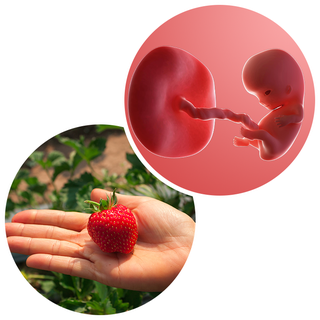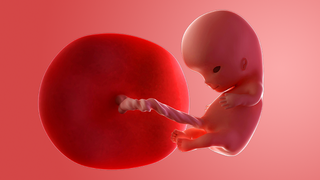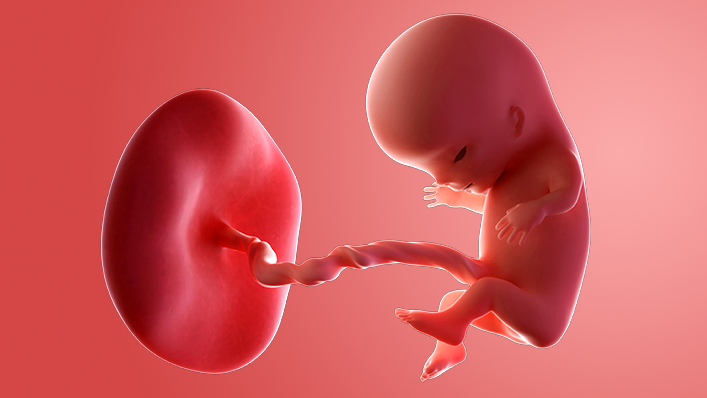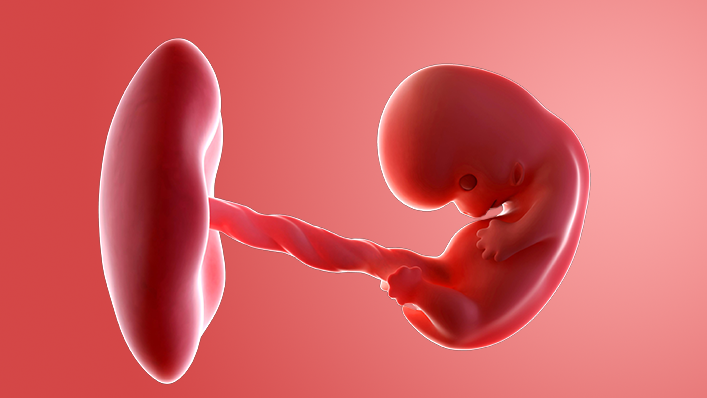Week 9
Your breasts will be bigger now and your waist may be thickening a little. Your pregnancy hormones are flooding your body, which may still be causing you to feel unwell.
Thankfully this will not last forever. In a month, you'll be entering the second trimester when many people start to feel lots better.
What's happening in my body?
Over the past few weeks, the levels of the pregnancy hormone, human chorionic gonadotropin, have been doubling in your body every 2 or 3 days. When you are 9 weeks pregnant, this hormone is at its peak.
You will also have higher levels of the other hormones, including oestrogen and progesterone. This powerful combo will help to increase the blood supply to your womb.
Some women describe this time as being like an "emotional rollercoaster", so get lots of rest and accept any offers of help.
Early pregnancy symptoms (at 9 weeks)
This is a tough time, but week by week you should start feeling better. Your signs of pregnancy could include:
- extreme tiredness
- feeling sick
- mood swings
- a metallic taste in your mouth
- sore breasts
- headaches
- new likes and dislikes for food and drink
- a heightened sense of smell
- a milky white pregnancy discharge from your vagina
- light spotting (see your doctor if you get bleeding in pregnancy)
- cramping, a bit like period pains
- darkened skin on your face or brown patches - this is known as chloasma faciei or the “mask of pregnancy”
- thicker and shinier hair
- bloating and the feeling of being bloated (read some ways to deal with bloating on week 10's page)
Tommy's, the baby charity, has a list of 10 common pregnancy complaints and advice on how to manage them.
Super snacks
It's tempting to reach for the biscuits when you're feeling tired and low, but try sticking to healthy snacks instead.
If you eat little and often throughout the day, it keeps your blood sugar stable, which can reduce morning sickness.
Here are a few snack ideas:
- boiled egg with wholemeal soldiers
- hummus with carrot sticks
- pitta bread with grated cheese
Here are lots more ideas for snacktime and some easy healthy recipes.
What does my baby look like?
Your baby, or foetus, is now around 22mm long from head to bottom, which is about the size of a strawberry.
The face is looking more recognisable, with eyes protected by eyelids, a little mouth and even a tongue with tiny taste buds.
The hands and feet are developing, but there are no fingers or toes yet, just grooves where they will be.
All the major internal organs – the heart, brain, lung, kidneys and gut – are developing. Bones are starting to form.
Your baby's genitals are also starting to take shape – but you probably won't find out if it's a boy or a girl until your anomaly scan at around 18 to 21 weeks.

Eye eye!
Your baby's eyes are getting bigger and will have a bit of colour in them now. It's a myth that all babies are born with blue eyes – they could be anything from slate grey to inky black depending on the parents' genetics. Eye colour often changes after birth.
Action stations
Sexually transmitted infections (STIs)
Do you think you or your partner could have an STI? If so, get checked out, as this could affect your baby's development. Talk to your midwife or GP, or visit a sexual health clinic.
Long-term conditions
If you have a long-term health condition, then let your specialist or GP know you're pregnant as soon as possible.
Don't stop taking any regular medication without discussing it with your doctor first.
Want to know when the baby's due?
Use the NHS's pregnancy due date calculator. You'll get a more accurate date from your doctor or midwife when you have a dating scan (usually at 8 to 14 weeks).
More in week-by-week

Week 10
Pregnancy is divided into 3 chunks, called "trimesters". You are nearly at the end of your 1st trimester.
More in week-by-week guide to pregnancy


